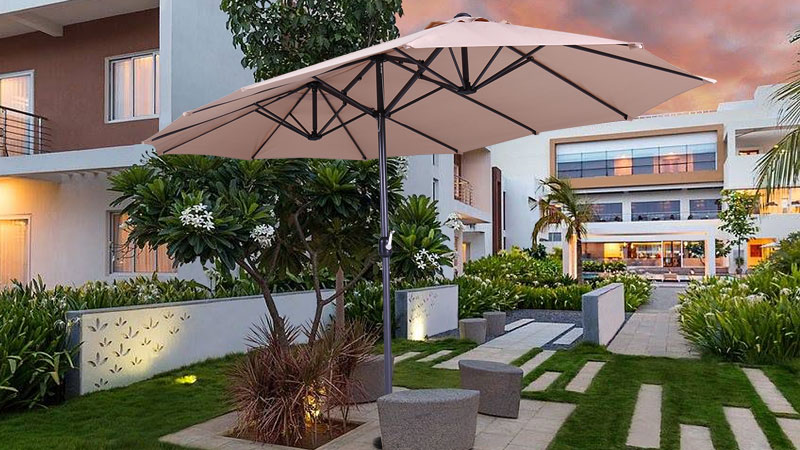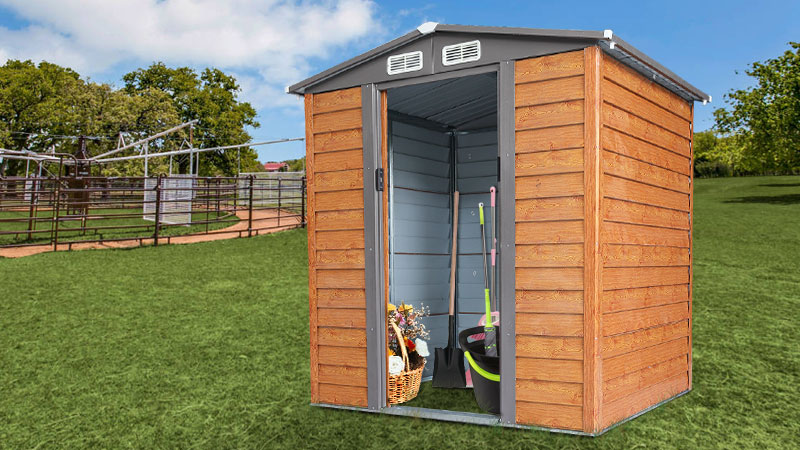Making an outdoor shed is a terrific method to increase storage space and maintain organization, but choosing the right material is the hardest part. Resin, wood, and metal are the three materials most frequently used to construct sheds. We'll be laying out the benefits and drawbacks of each so you can comprehend the applications for resin, wood, and metal shelters and make the ideal choice.
Resin Sheds
Resin sheds were developed to be a more adaptable, cost-effective, and environmentally friendly shed material. It addresses the significant drawbacks of each material while combining the majority of their positives. When compared to wood, resin sheds are more environmentally friendly, and Keter goes one step further by employing only recyclable materials. Generally speaking, resin-based shelters are becoming more and more well-liked due to their adaptability and simplicity. View the frequently asked questions regarding Keter resin storage sheds.
Pros
- Easy cleaning and low maintenance
- Rot, insect, and rust-resistant
- Easy to assemble
Resin shelters have a specific purpose in mind. They may be put together in a single afternoon and are designed to be simple to clean and move. Additionally, resin sheds require very little upkeep and are incredibly strong and weatherproof. Keter guarantees that its goods made of weather-resistant resin won't rust, rot, fade, peel, distort, or be impacted by insects. Resin huts, which come in a range of sizes, are an affordable substitute for timber sheds. In addition to being environmentally friendly and aesthetically pleasing, resin shelters made by Keter are able to reproduce the appearance and feel of wood without having an adverse impact on the environment.
Cons
- Need to be anchored to a base
- Can bear limited weight on their walls
Resin has few drawbacks, which is fortunate. Resin sheds cost more than metal sheds, require a base to be fixed to, and can only support a certain amount of weight on their walls (but less expensive than wooden sheds).
Wooden Sheds
The first shelters ever made were made of wood, which has a timeless, rustic appearance that may improve any area. Framing lumber and pressure-treated polywood are typically used in their construction to give them a traditional wood appearance.
Pros
- Strong and durable
- Visually appealing
- Easy to customize
The main advantage of selecting a wooden shed is that there are many different styles and sizes available, making it simple to pick one you enjoy. They are also incredibly sturdy and long-lasting without the requirement for ground anchors. The visual beauty of wooden sheds is one of the main reasons why so many people choose them, making them a wonderful option if you're looking for a shed that doesn't detract from the aesthetics of your space. Keter does, however, provide resin-based structures that mimic the appearance and texture of timber buildings without the drawbacks of wood.
Cons
- Not insect, fire, or weather-resistant
- High maintenance
Sheds are currently made from a range of materials, but there is a reason for this, which is unfortunate. The inability of wooden structures to withstand insects, fire, or the elements is just one of its numerous drawbacks. Additionally unsustainable for the environment, more expensive, and prone to rot is wood. For someone looking for a low-maintenance and weatherproof alternative, they aren't the ideal choice.

Metal Sheds
Because they are made of steel or galvanized aluminum and come in various gauges of thickness, metal shelters are a popular alternative to wood. Metal sheds have fewer designs, most of which appear the same, and fewer features than wood and resin huts.
Pros
- Low maintenance
- Durable
- Fire, insect, and rot-resistant
Metal sheds are strong, affordable, and have a long lifespan. Metal sheds are a low-maintenance solution because they are weather, fire, pest, and rot resistant, unlike wooden shelters.
Cons
- Need to be anchored to a base
- Not resistant to rust
Metal sheds, in contrast to timber sheds, must be fastened to a base and have a restricted range of sizes, designs, and customizations. Due to the weight of the metal, metal sheds are not rust-resistant and are also difficult to carry. We advise against choosing a metal shed if you want a structure that you can work in, is simple to put together, and looks good.
Common Questions
Is a resin shed better than a metal shed?
The decision between a resin and a metal shed depends on the shed's intended use. Although resin sheds can be more expensive, they are a better choice if you need a workspace because metal sheds get quite hot. Additionally, resin sheds are simpler to carry and put together. The location and aesthetics of your shed are also crucial because resin sheds have a variety of textures that make them more aesthetically pleasing and simpler to modify. Metal is a great option if you're searching for a sturdy and reasonably priced shed, nevertheless.
Are wood or resin sheds better?
What characteristics you value the most in your shed will determine whether you choose metal or wood. Resin is a great choice if you want a less expensive, weatherproof shed. Resin sheds are weather-resistant against rotting, peeling, corrosion, insects, warping, and fading. Additionally, resin is simpler to maintain and put together. If aesthetics is important to you, both resin and wood will offer you the same traditional wood appearance. This is due to the fact that Keter offers resin-based structures that mimic the appearance of wooden shelters while yet offering all the advantages of a resin shed. There are pre-assembled wooden sheds available, though, and they don't require any ground securing. Wood is a preferable choice if you're searching for a simple, fast solution that doesn't need to be assembled.

Which Shed Should You Buy?
The choice of shed ultimately depends on your personal preferences. The distinctions between resin, wood, and metal can be broken down into four groups: cost, toughness, upkeep, and assembly.
The most expensive and least environmentally friendly alternative is wood, the second most expensive and most environmentally friendly option is resin, and the most affordable but most difficult to transport and construct option is metal.
All three materials are strong and capable of supporting whatever you want to store. But you should keep in mind which choices will hold up the best in the worst weather conditions. Wooden sheds are not always waterproof, rot-proof, or fire-resistant. Due to their resistance to fire, insects, decay, and the elements, metal sheds are more durable. Although they can corrode, metals are more resistant to the elements than wood. Because it resists weathering, fading, rusting, bending, rotting, insects, and fire, resin is the most enduring material.
The last thing to think about when buying a shed is assembly. There are several pre-built wooden huts that just need to be installed. The majority of wooden sheds, nevertheless, are challenging to construct and demand a lot of time and effort. Metal sheds are very challenging to erect, and once constructed, they are exceedingly challenging to move. Because resin is a lightweight substance, it is the simplest to construct and move to a different site.
Conclusion
All three types of shed materials are strong and functional, but metal and resin are superior choices for structures that can withstand harsh weather without needing upkeep. If aesthetics are important to you, wood and resin sheds are the finest option. If you want a shed that combines all the advantages of wood and metal while also being a sustainable alternative, resin sheds are your best choice.
Resin sheds are an affordable option for anyone who wants to buy a shed once and never have to think about it again. They were developed to handle all the drawbacks of wood and metal. You won't have to be concerned about anything decaying, warping, fading, or rusting. Just put the shed together and start organizing.
We urge you to look into the different shed sizes and styles that Keter provides. Keter also offers boxes and storage benches if you're seeking for additional compact storage options.






